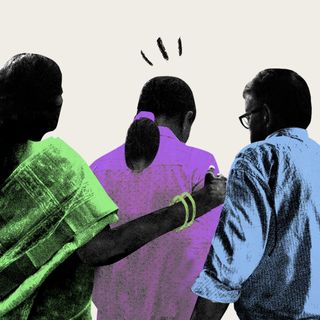
Body Matters: Navigating Abortion in India
“It was quite harrowing, [the gynac] was very rude and started preaching to me… As though I’d done something morally wrong.”

In ‘Body Matters,’ we explore the lived experiences of OB-GYN patients in India who defy stereotypical gender expectations, and challenge what it means to be a body that matters in medicine.
What to Expect
There are several options for availing abortion — a legal procedure in India — with the most common being medical abortion and dilation and curettage (D&C). The World Health Organization guidelines layout best practices for healthcare providers, but these are often not followed. As a result, patients in India are left with limited options and mounting stress, pain, and anxiety over abortions. Doctors fail to uphold even bare minimum standards, leading to complications.
Before the procedure:
The standard protocol that doctors should follow is taking a history of the menstrual cycle, the last instance of sexual intercourse, followed by blood tests, and an ultrasound. The tests are especially important to ensure that the person isn’t anemic and to locate the pregnancy; if it is in the fallopian tubes, the medication route is ruled out. Doctors should also explain the steps involved, the pain to expect, and supervise the whole procedure.
After the procedure:
Patients can expect bleeding for about 5-10 days. It is common practice to call people for a follow-up ultrasound two weeks later and start people on contraception by laying out all the options – even before the next period begins.
What It’s Really Like
Five people – S.G., J.A., A., C.P., and K.C. – share their experiences on what went wrong. A doctor sets the record straight.
When Doctors Don’t Ask About Consent, Refuse Treatment
At the very outset, doctors don’t take a patient’s history with sensitivity, leading to trauma for people whose pregnancies were the result of non-consensual sex.
JA: Around 2013, back when I was in school, I was in this relationship where I lost my virginity to my then-boyfriend. The first time wasn’t exactly consensual, because I was pressured into doing it and I complied because I was scared. After that, I got pregnant. I myself wasn’t aware of the fact that the pregnancy was actually a result of the assault. I was misled by my then-partner into thinking that… I had to have sex with him since we’d been together for two years or so.
It was quite harrowing, [the gynac] was very rude and started preaching to me since I was underage — as though I’d done something morally wrong. She also reiterated that abortions were mostly only meant for married women with complications in their pregnancies and that it would go against her ethics to take on my case. I’d have to have a legal guardian/parent present with me, to consent to it. I obviously couldn’t tell my parents, I was really scared. My partner didn’t want much to do with this… But she [gynac] strictly asked me to bring my parents or legal guardian with me if I wanted the abortion. Only after she speaks with them, would she consider doing it.
Dr. Sujatha Rajnikanth: Asking about consent should be part of the process. There isn’t much the gynac can do to prove consent or non-consent unless patients come immediately. The gynac has a smaller part to play as compared to taking the case to a legal authority. But maybe for the psychological part of it, treating the person, and giving her the abortion she needs — the gynac can find out if it was consensual or not. Emotional counseling is definitely necessary.
Ethically being against principles is the doctor’s call — they have their own reasons. The law says that if you’re not going to do it for moral, spiritual, ethical reasons, it is your duty to refer them to a doctor who will actually do it; not simply wash your hands off the patient who are then left wondering where to go or whom to approach.
Related on The Swaddle:
Abortions: Visualizing the Data on One of the Most Fraught Topics in Women’s Health Care
When Doctors Make Moral Judgements
Despite the law clearly allowing doctors to perform abortions without a guardian’s consent for majors, many doctors refuse treatment on moral grounds and beliefs about motherhood. They also go on to make emotionally scarring statements, shaming patients instead of providing help.
SG: I’ve had two procedures. One was a D&C when I was 18. I didn’t tell my mom because legally I think once you are 18 you are allowed to do it on your own — you don’t need a guardian. The gynac… said that she’ll only treat me if my mom comes because she said I was too young.
A: The doctor sat in a free-of-cost government dispensary. I needed her to approve an ultrasound for me so I could go and get it done at the discounted rate. Instead, she started saying terrible things like, “You should be ashamed, if I was in your place I would never show my face to my parents and just kill myself.” She also called my mother to inform her that I was pregnant.
JA: [A]fter I told my doctor I was 17, she followed up with a condescending tone saying, “Then, I’m sure you wouldn’t be married.” It made me pretty uncomfortable. She started going off at me because she insinuated that I’d done something morally wrong, questioning my upbringing and stuff.
She went on with the moralizing: “girls your age do all kinds of things behind their parents’ back. Imagine how your parents would feel if they knew what you’d done. Your virtue is meant to be safeguarded until you’re married,” etc. I was made to feel really horrible about myself and judged myself for it for a long time. I just felt really lonely and alone through the entire process.
When Doctors Provide Misleading Legal Information
Doctors also misrepresent the law — either out of ignorance or in a deliberate attempt to shame people. This leaves people with few options and in precarious situations.
A: My mother, who was super pissed with me, finally took me to the All India Institute of Medical Sciences (AIIMS) trauma center — which is their emergency department. The nurses there were pretty nice, but the attending that night had zero idea about abortion/rape laws in India. He kept insisting that I had to sign saying that I was raped since I was unmarried. I obviously said no, because I hadn’t been, and also because that’s not a law, and the nurses and gynecologists on round finally came in and straight away operated on me to remove the affected fallopian tube.
SG: [The doctor] told me to pretend like I was married to my boyfriend because they took me to some seedy clinic. I have no idea why he didn’t want to do it in his clinic. I think it was because I just turned 18 and was unmarried. Everyone was scared of giving me the procedure because I was 18 and also it was quite complicated. That’s why the first doctor said no to me.
Dr. Sujatha: Abortion is not illegal; you don’t need your husband’s or your partner’s consent; any woman can get it done. Medical abortion has made things very easy for obstetricians. Unfortunately, I’ve heard about this taboo — doctors tend to be harsh and judgemental. It is a fact that premarital sex is common and not a big deal; people have a hard time accepting it. I’ve had so many queries through mails asking if they can come, but they don’t because they’re afraid I will be a judgemental doctor like everybody and yell at them. But that is also the perfect time to talk to them about contraception.
The Price of an Abortion
Abortions can cost a lot — depending on the procedure opted for. But the stigma around it means that many young women are unable to access money on time, leading to exploitation and situations bordering on medical emergencies.
KC: [The doctor] jotted down my last period date, and explained what it would be like to go through abortion with the options being a pill and a D & C. They then suggested I should go for a D&C despite not knowing the size of my fetus (prior to my sonography) 00 maybe because it was a more expensive option.
CP: The private hospital in Delhi that I went to had set abortion “packages” for Rs. 7,000 – 10,000. I didn’t have access to that kind of money so I had to beg the gynac to prescribe me the oral abortion pill separately, which was only Rs. 300 (she did this after giving me a long lecture on premarital sex. I already knew about the pill; I had to request her to write me a prescription because I couldn’t afford the package.
Related on The Swaddle:
Body Matters: Navigating Asexuality in a Gynaec’s Office
A: I got a Salpingectomy (removal of my fallopian tube) done in 2017 to remove a life-threatening and very painful ectopic pregnancy. It was a horrifying experience — most of the horror stemming from me being 18, unmarried, and broke/unable to access money from parents.
I finally got an ultrasound done after I got some money, but the lab technician didn’t really know about how to scan an ectopic pregnancy and so I wasted money on that. l got the diagnosis for an ectopic confirmed by another hospital … but I couldn’t afford to be treated there since I did not have the money. [B]ecause of not being able to ask my parents for money, I kept delaying doing something about it, until the pain, bleeding, nausea, and my low blood pressure caused me to lose consciousness.
SG: [The doctor I visited after the first one refused] told me that it’ll be very hush-hush. That procedure cost me Rs 17,000. I paid in cash and there was no record. They knew we were desperate; I think they overcharged us.
When Doctors Ignore Pain
Abortions are painful in more ways than one, but they don’t have to be. However, doctors don’t warn patients about the pain, nor do they give them recourse that’s easily available.
KC: They said to just have a painkiller for the pain. Never told me how bad it would be, and then later when I called and cried for help, they told me that my threshold for pain could be low. The pain from the pill was excruciating.
SG: They didn’t explain anything about the process; nothing before the procedure. The nurse when she gave me the pill told me it would hurt, but it [the conversation] was very casual. They didn’t even have pads in the clinic… They didn’t offer any medication for the pain; I just took a Crocin.
Dr. Sujatha: A prescription should contain the required medication, along with a single course of antibiotics and pain medication. After the second dose of medication, within the hours the process starts. [When] the cramping starts, I tell them to take a painkiller. More than two-three won’t be required.
Sometimes women call in with unbearable pain and I may have to call them in for a shot or tell them how else to manage it. Once the product is expelled, the pain comes down to a tolerable cramp and it slowly goes away. I definitely tell them there is going to be pain.
What Inaccessibility Can Result In
SG: The second time it [abortion] happened, I was 20 and I was in a different, abusive relationship. We weren’t using protection and I got pregnant, but I detected it early. He got the RU486 [the abortion pill] from a shady medical store, it cost a total of Rs. 700. I was in an Oyo or an Airbnb during the process, and I was there for five days and didn’t let anyone inside the room. I was in pain for two days. I think I passed the fetus in the loo while blood was coming out of me.
Dr. Sujatha: Unfortunately, this pill is available over the counter (OTC). If you walk into a pharmacy and say you need an abortion, you will get a nice kit that contains all the medicines. This is dangerous. If [someone] does this without checking for blood group, or if the pregnancy is in the uterus, it will end up badly. 99% of the time, the tablet takes care of the process. Sometimes, there can be excessive bleeding, incomplete emptying. This is when you need a doctor to do a D&C procedure if need be. If the pregnancy was not in the uterus and was in the tubes, and if the abortion happens in the tubes, theycan rupture and it can become a medical emergency. This is why it is not advisable to do it OTC. It can be a life-threatening situation.
When Doctors Lack Empathy:
SG: They gave me a pill and it induced a lot of pain. I soaked through six-seven pads in an hour. There was a lot of blood, and I was crying and completely alone. They didn’t allow me to see anyone else. The fetus was as big as a small lemon. They asked my boyfriend if he wanted to see it; he said no, it’s traumatizing. So they threw it, I woke up and I had lost a lot of blood, a lot of water and weight. I was very weak.
A: I used to identify as nonbinary before all of this… but a lot of things related to my gender changed on the night of the surgery, and in general in the week of this diagnosis. I still have trouble calling myself a woman, but I feel I was reduced to what my sexed body could do.
Dr. Sujatha: When we learn to take histories as 3rd or 4th-year students, we do try to show empathy and be nice. Psychology is one month of our internship posting, but not much is done as part of training. I’m hoping it is a little better now – I never had this training but luckily I worked under two excellent doctors who had a lot of empathy right from a pelvic exam to talking to them, being progressive and open about all aspects.
The above insights were obtained from five patients and one doctor — all of whom had vital things to share about what the doctor-patient relationship should not look like, and a roadmap for what it should look like. The narratives here are as told to The Swaddle, and are preserved for maximum authenticity of lived experiences. They have only been edited and organized thematically for the sake of clarity.
Related


How Women’s First Sexual Experiences Shape Their Sexual Desires Later in Life
